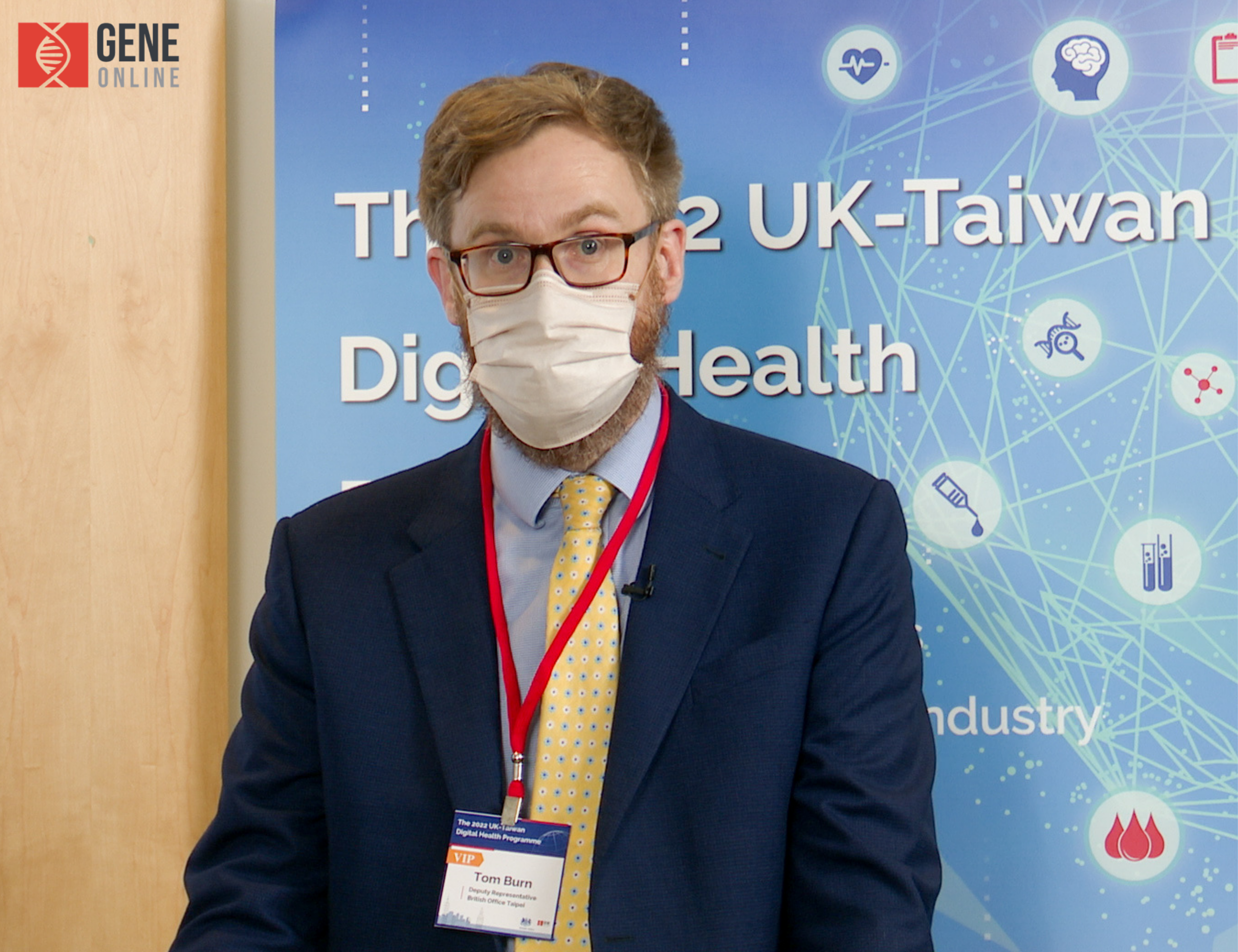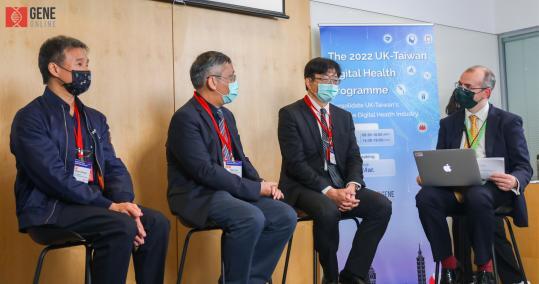UK and Taiwan to Cooperate for Breakthrough in Digital Health Innovations
Graying societies are becoming a common sight in the Global North as people are living longer. To cope with the increasing burden of healthcare brought upon by old age and other factors, Taiwan is turning to digital health innovations to transform public health. The island is on the lookout for international partners to complement its strengths and take healthcare to the next level.
The 2022 UK-Taiwan Digital Health Programme is a networking event offering UK and Taiwan digital health businesses and academia a chance to collaborate and explore joint areas of interest, research and partnerships, with the potential of expanding into markets in the Greater Asia-Pacific region.
Organized by the British Office Taipei and GeneOnline, the two-part program consists of a virtual webinar and a B2B matchmaking component.
The online webinar, which launched on February 10, was designed to educate UK parties on Taiwan’s digital health market and regulatory landscape. Close to a hundred UK and Taiwan businesses and academics joined the event, which invited leading figures in Taiwan’s budding digital health scene to share their insight on future trends and status quo.
Complementary Strengths
In his opening remarks, Tom Burn, the Deputy Representative of the British Office Taipei, remarked on strong complementarities between the UK and Taiwan.

Tom Burn, Deputy Representative, British Office Taipei
| He pointed to the UK’s research and data collection prowess, which enabled the rollout of the Oxford-AstraZeneca COVID-19 vaccine and the huge amount of genomics sequencing on COVID-19 samples. Taiwan, for its part, brings world-class technologies and manufacturing expertise to the table, Burns said. |
Po-Chang Lee, the Director General of “National Health Insurance Administration” (NHIA) under Taiwan’s Ministry of Health and Welfare (MoHW), gave a snapshot of Taiwan’s Health Insurance system.
Taiwan’s health insurance system is a single-payer system run by the government. Almost all Taiwanese are covered by the system, while up to 93.03% of healthcare providers are contracted to the NHIA. The administration promotes a global budget payment system which decides how much it wants to spend on each area of medical care. There are privileges for the disadvantaged too, said Lee.
|
Lee further introduced “My Health Bank”, a synchronized system for hospitals and clinics to access patients’ clinical data to provide better treatment. Lee mentioned that access could also be extended to research institutions and industrial players. For example, pharmaceutical companies could collaborate with the NHIA for long-term follow-up of patients receiving medical treatment. |
An Overview of Healthcare in Taiwan
Marc Hsu, the Dean of the Office of Data Science at Taipei Medical University, began with some basic facts about Taiwan before introducing key features of Taiwan’s healthcare system.

Marc Hsu, Dean of the Office of Data Science, Taipei Medical University
Taiwan’s population (23 million) is comparable to that of Australia, but with only 5% of the land area. Taiwan, like many parts of the developed world, faces a so-called “aging tsunami”, where an increasing proportion of people are reaching ages of over 65, said Hsu. Taiwan spends around 6.5% of GDP on its health expenditure, but Hsu believes it should not be called “expenditure” but rather “investment” in healthcare to cut down on the cost of healthcare burden.
Taiwan’s health insurance system is maintained by three pillars: the NHIA, the insured, and the providers. The NHIA collects premiums from the insured and issues smart cards to citizens. Providers service the insured, submit patient’s clinical data to NHIA, and receive reimbursement from the administration.
Building on Lee’s opening remarks, Hsu highlighted three major successes of the NHIA: the global budget payment system, a robust IT infrastructure and smart leadership.
Firstly, the global budget helps with cost containment, said Hsu. Secondly, smart cards are key to the whole IT system. Besides uploading clinical data to the database, citizens with smart cards can access their own information on the “NHI Express” mobile app. For example, they can use the app to view their COVID-19 test results within 24 hours, instead of returning to the hospital.
| The smart cards also play a role in TOCC (Travel, Occupation, Contact history, Cluster), the information of which is used by authorities to track and prevent the spread of COVID-19. TOCC-based rapid triage, using data from NHRI’s MediCloud, removed the need for long queues in public spaces simply by inserting the smart card into a reader. Furthermore, machine readers were trained to determine if visitors wore their face masks correctly, and were also able to take the body temperature of people passing by. |
Similar to the UK’s Biobank, Taiwan also manages its own Biobank containing genomic data from a million individuals. Other genomic data collection initiatives include the Taiwan Precision Medicine Initiative, said Hsu.
Hsu concluded that while Taiwan’s healthcare sector is quite good, there are many learning opportunities to learn from UK counterparts, given the extensive history of the National Health Service (NHS).
Taiwan’s Digital Health Landscape
Brian Chong, Vice President of Wistron Medical Technology began with a quick analysis of megatrends affecting the medical industry, and compared the healthcare systems of the UK and Taiwan.

Brian Chong, Vice President, Wistron Medical Technology
Healthcare costs are rising around the world, said Chong, due to a variety of issues ranging from aging populations and environmental degradation to a shortage of healthcare providers and increasing prevalence of poor lifestyles and habits. COVID-19 and other illnesses also contribute to rising costs, said Chong.
The leading causes of death are slightly different in both markets, said Chong. Cancer tops Taiwan’s list, followed by heart diseases, pneumonia, stroke, and diabetes.
Taiwan has achieved similar rates of vaccination as the UK (over 70%), but quarantine measures and face masking are still largely upheld, while the UK has relaxed its policies.
While the UK companies are experts in software, medical research, and AI modeling, Taiwan’s companies mainly focus on ICT hardware technology and the design of medical devices. The complementary features are ideal for the UK and Taiwan to collaborate, said Chong.
Taiwan has so far seen limited deployment and development of telehealth, which could be a point of collaboration for UK companies, suggested Chong. Another area where the UK’s strengths show is in cybersecurity; many clinics in Taiwan lack secure digital capabilities.
| UK companies could enjoy the hardware expertise and stable supply chains offered by their Taiwanese counterparts. Furthermore, they can help develop the business model for product commercialization in Taiwan. |
Regulatory Environment of Digital Health in Taiwan
Jarret Su, the Co-Head of Healthcare and Life Science at KPMG in Taiwan, outlined the rules governing Taiwan’s digital health scene and incentives for businesses focused on digital health.

Jarret Su, Co-Head of Healthcare & Life Science, KPMG in Taiwan
Taiwan’s geographic location is a plus for foreign investment, said Su. What matters next is the identity of the investor. For investors in the UK, they have almost complete freedom to invest, barring sensitive areas.
Regulations over healthcare are divided into two categories: medical care and pharmaceuticals, which are governed by different acts and authorities.
A doctor intending to practise telemedicine would be subjected to the “Rule of Medical Diagnosis and Treatment by Telecommunications”, for example.
With that said, the government has progressively deregulated telemedicine, expanding its use to remote areas, people living with disabilities and foreigners in Taiwan. During the COVID-19 pandemic, telemedicine has even been used to monitor individuals in self-quarantine.
On the other hand, pharmaceutical companies need to consider the Pharmaceuticals Affairs Act, which covers drugs and medical devices. Approvals for a new drug are reviewed by the Taiwan FDA (TFDA).
If a product is approved by the TFDA, it will likely be approved in the US, the EU and other parts of the world, said Su. He raised the example of Deep01, a Taiwan-based company that won approval for its AI detection system for intracranial hemorrhage in the US, UK and Japan shortly after its approval by the TFDA. Su asserted that TFDA-approved products developed by UK companies will likely follow a similar pattern of approvals.
Finally, Su highlighted the Act for the Development of Biotech and Medico-Pharmaceutical Industry, which was enacted at the end of 2021.
| Precision medicine, regenerative medicine, digital medicine and novel technological platforms were included in the scope of the Act. The Act also added contract development and manufacturing organizations (CDMO) as a new business type. Incentives promoted by the Act include tax reductions for angel investors and tax credits on R&D expenses, investment in facilities, and tax deferrals or preferrals on employee stock-based compensation. |
Live Q&A Session
In the following live Q&A session, the three speakers answered questions from the audience. The discussion was moderated by Guy Robertson, Senior Science and Innovation Officer at the British Office Taipei.

From Left to Right: Brian Chong, Marc Hsu, Jarret Su, Guy Robertson
“What makes Taiwan stand out in the Asia-Pacific region?”
Chong pointed out that Taiwan’s expertise in hardware-based ICT and semiconductor manufacturing could assist UK companies in optimizing the manufacturing process and innovating digital health products.
“Many of our customers come to us with prototypes that are huge, unwieldy and not ready for manufacture, and we help them make a real product that can be commercialized,” said Chong. He added that Taiwanese contract manufacturers already set up facilities in many parts of the world, ensuring a stable supply line.
Su added that the Taiwanese government’s inclusion of CDMOs and CMOs in the biotech development act will assist the development of medical products.
“What is the product and services trend for digital health in Taiwan?”
Chong listed the miniaturization of technologies, such as wearable health checkers, as the major trend of development in Taiwan. The second trend is precision medicine, said Chong, in terms of genomics and the development of life science instruments.
Hsu agreed that precision medicine is an important trend in digital health for individuals.
“To develop precision medicine, you need data, you need computing power, you need algorithms, you need applications,” said Hsu. The second trend, he mentioned, has to do with “smart hospitals” and the utilization of IT tools to make hospitals more efficient in providing care.
Su added that people are becoming more concerned over the collection and usage of personal data. In recent years, the government is introducing measures to harmonize personal privacy laws with other markets, enhance informed consent, and de-identify personal information. In doing so, healthcare data could be commercialized into more applications, said Su.
“Telecare trends are rising in aging societies. What are the regulatory barriers in Taiwan and key strengths in interdisciplinary cooperation?”
Telemedicine sees little uptake in Taiwan given the small size of the island, said Su, while most people find it more convenient to speak to a doctor face-to-face. However, Taiwan could function as a demo site for telemedicine. By combining Taiwan’s IT capability with the UK’s software expertise, and applying it in medical institutes, Taiwan could create telecare products for the world. The government’s attempts to deregulate telemedicine would also clear the path for the development of products, said Su. Hsu drew a line between telemedicine and telehealth. He argued that a shift from acute care to managing chronic diseases such as diabetes and asthma, as well as health promotion, would be the way to go.
As the digital webinar came to an end, Robertson thanked the three speakers for their time. In the following months, UK companies and academia will be matched with those in Taiwan, and embark on a journey together to transform digital health.
Register to B2B Matchmaking (Mar. 7-11th): click here.
©www.geneonline.com All rights reserved. Collaborate with us: service@geneonlineasia.com








